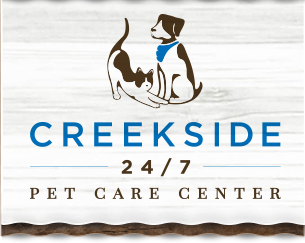We consider pets that are
SEVEN YEARS OLD
or older to be senior-aged pets. At this stage in their lives, dogs and cats are more susceptible to contracting health issues. Early detection can help prevent disease and minimize suffering of an older pet.
Dog Years VS Human Years
7 dog years = 44 – 56 years
10 dog years = 56 – 78 years
15 dog years = 76 – 115 years
20 dog years = 96 – 120 years
Cat Years VS Human Years
7 cat years = 54 years
10 cat years = 63 years
15 cat years = 78 years
20 cat years = 97 years
Getting Older Means Going to the Vet More Often
While annual check-ups are important for pets of all ages, making more frequent vet visits is especially important for mature pets. We consider pets that are seven years old and older to be senior-aged pets. At this stage in their lives, dogs and cats are more susceptible to contracting health issues, including the following:
- Diabetes
- Arthritis
- Heart disease
- Liver disease
- Certain types of cancer

We recommend bringing your senior pet to our facility at least twice a year for head-to-tail examinations and evaluations, vaccinations and lab tests. Routine visits to Creekside allow our veterinary team to stay on top of your senior pet’s health and keep you in the know about any potential ailments.
HOW TO KEEP YOUR SENIOR PETS HAPPY & HEALTHY
Regular veterinary check-ups are some of the easiest ways to ensure the health of your mature pet, but there are a few other things you can do to keep your senior pet happy and healthy, including:
- MOBILITY AIDS – Senior pets may not be able to get around as easily as they used to. You can provide assistance by placing ramps for access to high areas like beds and furniture and adding rugs for improved traction on slippery flooring.
- EXERCISE – Exercise is just as important for senior pets as it is for younger pets. It keeps them mobile, boosts their mood and impedes weight gain.
- COMFORTABLE BEDDING – If you haven’t already done so, consider providing your senior pet with a soft, supportive bed for naptime and bedtime.
- HEALTHY DIET – Aging pets should eat food that is tailored to their age group for optimal digestion and caloric intake.
- CAREFUL MONITORING – Keep a lookout for changes in your pet’s behavior and mood, as they may indicate a health condition. Pay special attention to eating, drinking, sleeping and bathroom patterns. Make sure to let your vet know about any changes.



